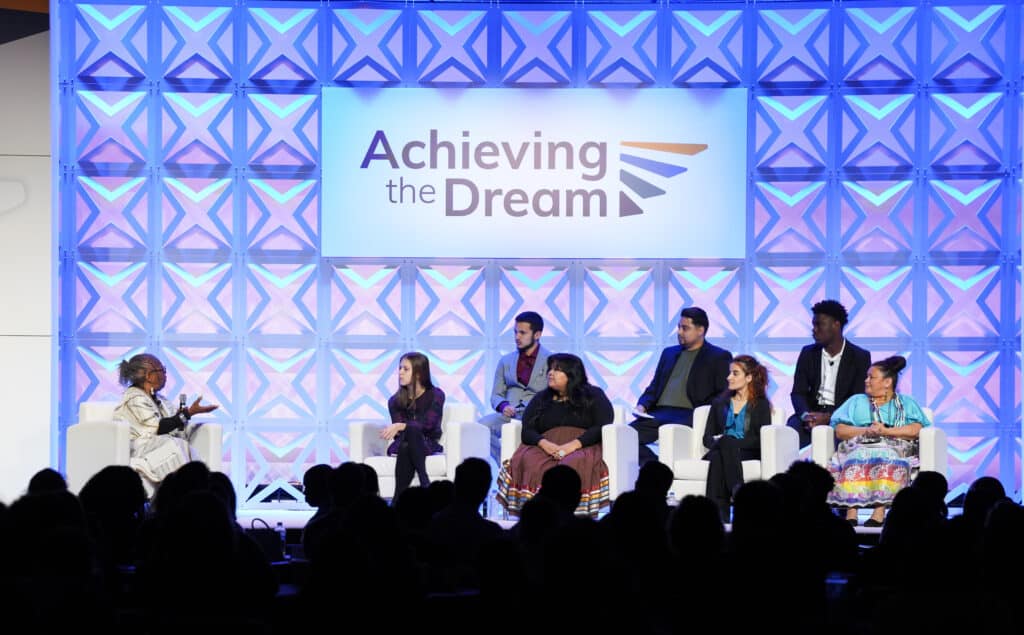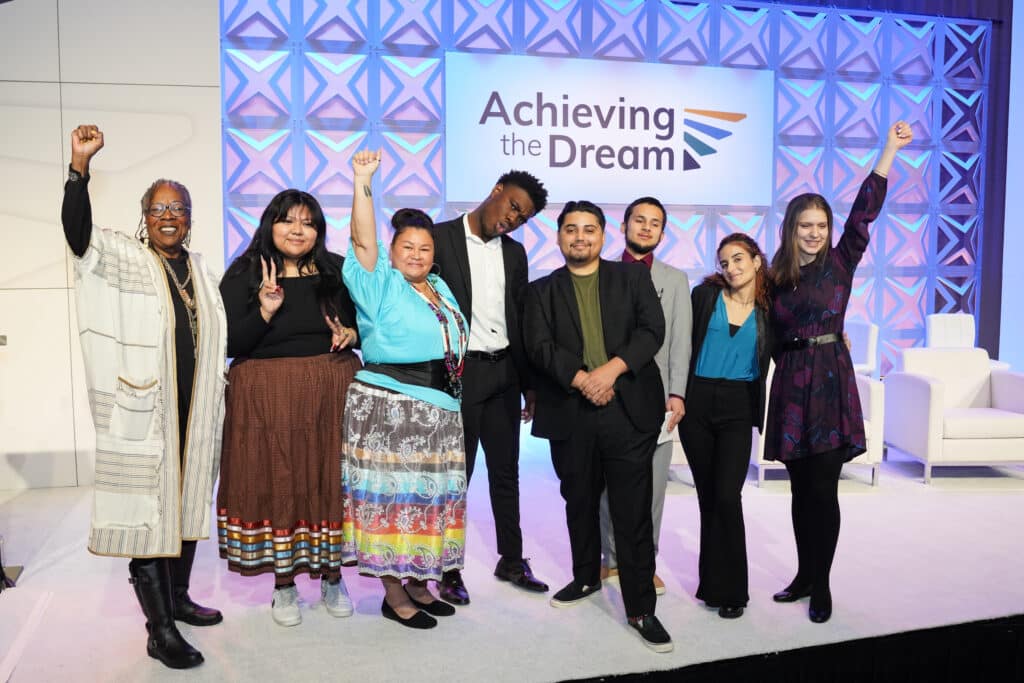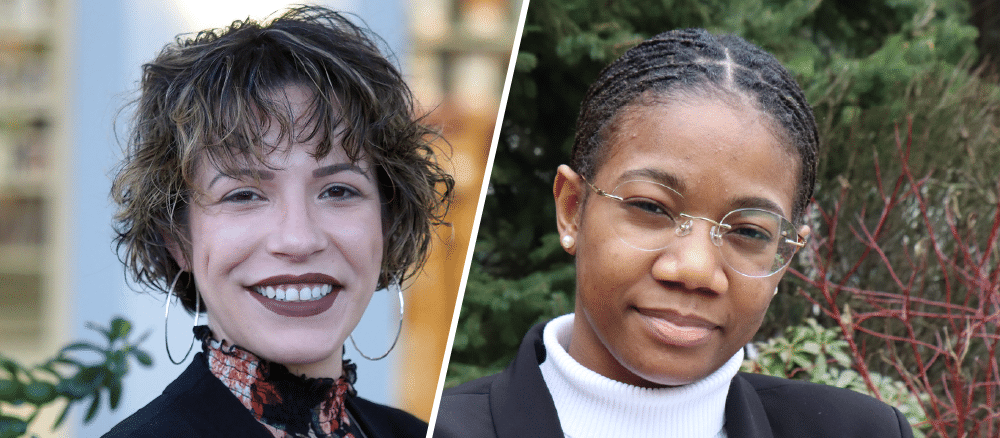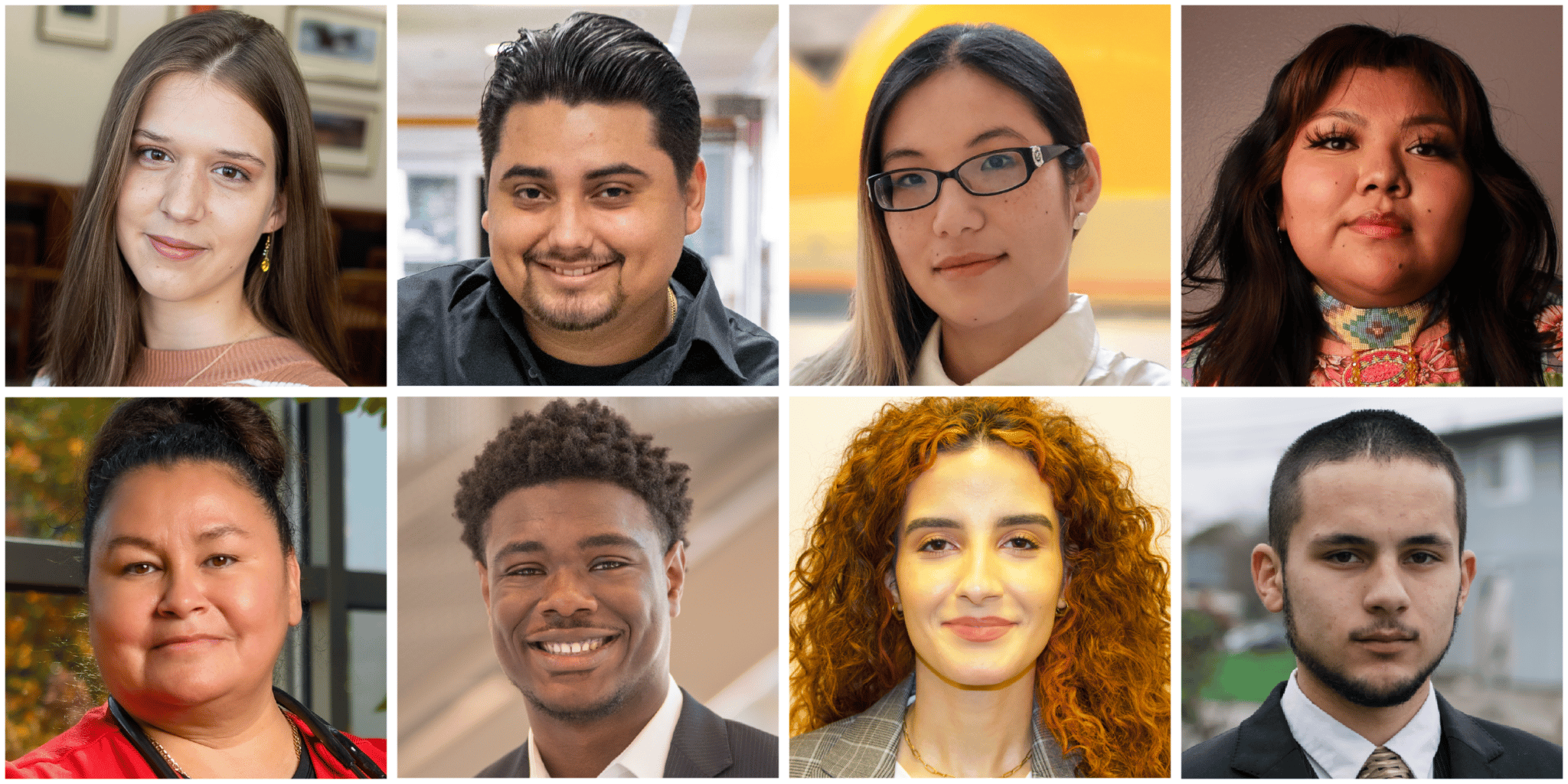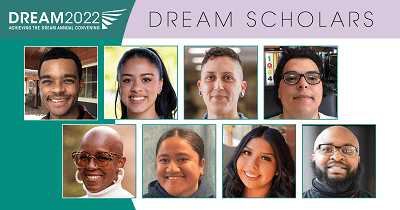On the last day of DREAM 2023, conference-goers gathered in the McCormick Place Convention Center’s Skyline Ballroom to attend one of the most popular sessions of the annual convening: a panel discussion with the DREAM Scholars.
Each year, eight community college students selected for the DREAM Scholars program attend the conference, speak with college leaders, share their experiences, and reflect on their experiences to a large audience of educational leaders and practitioners.
Every student has a story
The DREAM Scholars this year represented eight colleges, seven states, and diverse backgrounds and experiences. (Nikki Tam of Kingsborough Community College (NY) was unfortunately unable to attend the conference.)
Throughout DREAM, the scholars wrote poems about their educational journeys and read them to attendees during plenary sessions. To kick off the closing panel, Dr. Joye Hardiman, executive director of Ancestral Art Works and professor emeritus at The Evergreen State College, asked each scholar to share a meaningful passage from each of their poems.
Zachary Arreola, a Gateway to College student at Laney College (CA), shared his goal to “run a hospital for the underrepresented.” As a member of the Latinx community, Zach stressed, “I want my nieces, nephew, and the future to grow up in a world where they feel like they belong.”
Luis De Luna, a student at MiraCosta College (CA), referenced Frank Ocean when he recited, “I am the I am.” For Luis, it was a line that didn’t resonate with him until he underwent change and development as a young adult and began to understand the importance of identity.
Tommy McCall of Tallahassee Community College (FL) discussed his diagnosis of juvenile myoclonic epilepsy, a condition that caused him to have recurring seizures and develop a stutter. While his peers often defined him by his stutter, Tommy was determined “to do whatever it takes, so that people know I have more to give.”
Eve Miclaus of Roane State Community College (TN) said her favorite line of her poem was “I will, not because it will be easy, but because there’s no other way.” She said the process of writing her poem was empowering because it allowed her not only to reflect on where she had been, but to voice where she wants to go.
Sareya Taylor, a creative writing and poetry student at the Institute of American Indian Arts (NM), loved introducing herself in her native langue when she performed her poem, which discussed how she was “made up of my people” — Sareya is Apache and Navajo. “Being able to express … that everything I do is for my people, at the end of the day, is really important to me,” she said.
Vitória Nogueira of Housatonic Community College (CT) shared this line from her poem: “I am from dreaming big and high, because that is a good way of flying.” The line was something her favorite poet shared with her, and it has inspired her through hard times. It helps her reflect on how far she’s already come and to remember that “in ten years I’m going to look back and it’s going to be even higher.”
Tena Rynn Quackenbush, who is studying nursing at Western Technical College (WI), had included a line in her poem about bringing the accidental overdose rate down to zero in her county. She discussed the urgency of preventing accidental drug overdoses and the strategies she employed to help the people in her community — from Narcan trainings to harm reduction practices like clean needle exchanges. Powerfully, she shared that there were zero accidental overdoses in her county in 2019.
Learning and growing together
When asked about the most memorable or surprising moments of the conference, the DREAM Scholars spoke about holistic care, interdependency, and a sense of belonging.
Luis was struck by the feeling of community in the conference center. Throughout the event, he came to understand that his own college was not an island, but part of a broader network that “people like Zach, people like Tommy, and everyone else is a part of. And we are here to discuss how to improve that community, how to make it better for people like us.”
Tena was proud to learn at DREAM that Western Technical College, which she attends, works with incarcerated and justice-involved learners. She was encouraged to see Western Tech and other institutions working toward lowering barriers “that keep people like myself from living successful lives.” Everyone, Tena said, “has the right to start over, to a second chance.”
Sareya valued the time she and the other scholars got to spend with closing plenary speaker Frederick Shegog, whose concept of “giving life out to people” struck her. She talked about the importance of seeing students as people, beyond just numbers. “There’s no holistic care in asking someone first for their ID number instead of their name,” she said.
In the same vein, she said she enjoyed attending an event with a strong Indigenous presence, and she felt not only supported by a broader community but encouraged to see that tribal values were being shared with predominantly white institutions. “When we talk about holistic care, I think tribal colleges have been doing that for a long time.”
Many scholars agreed that one of the most valuable parts of their experience was the opportunity to get to know each other. Vitória was surprised by how quickly she and the other scholars built a close connection — “like family.” She valued the time she and her peers had alone, when they could swap stories process all they’d learned throughout the day.
“I’m a shy person,” Eve shared. “But I had some of the best conversations, and I’ve really enjoyed being able to network and have some of my own thoughts and beliefs challenged.”
The entire panel nodded and shared smiles while they talked about the lasting connections they had made in Chicago that week.
Their vision for community colleges
To close the panel, Dr. Hardiman asked the scholars what they would do if they found themselves in the role of community college president. Each of their responses spoke to challenges they have experienced as students, needs they have seen go unmet among their peers, and their hopes for themselves and their communities.
“Day one, hour one, minute one,” Zach said, “the first thing I would do is build dorms on campus for the unhoused population.” He stressed that homelessness and housing insecurity are huge problems in Oakland, ones that he feels are not being addressed urgently enough.
Tommy, Eve, and Vitória shared that they would increase communication between leadership and students. Tommy said students often want to know why certain choices are being made, but talking to administrators can be intimidating. Eve wanted to see more student representation in rooms where decisions are made. Vitória said she would schedule meetings with students, striving to “make it casual so people don’t feel intimidated … so they can just be real about what matters to them.”
Tena shared that she would work to implement peer specialists and peer support systems. She called back on her own experience with addiction. “In twelve-step programming, we talk about how there’s therapeutic value of one addict helping another.” Tena saw value in this type of peer support not just for people struggling with substance addiction, but for any students coping with anxiety, trauma, or the everyday stress of college. Addressing taboo topics like addiction or suicidal ideation head-on would go a long way toward making people’s lives better, she said.
—
When the panel concluded, ATD’s president and CEO Dr. Karen A. Stout presented each scholar with a financial gift. Thanks to year-round contributions to the DREAM Scholars Fund, Achieving the Dream was able to present the largest gift ever awarded to a cohort of scholars: Each student received $3,500 to further their personal and educational journeys.
Students are at the heart of ATD’s work, and each year we are grateful for the opportunity to support and to gain insight from these learners, advocates, and leaders.
